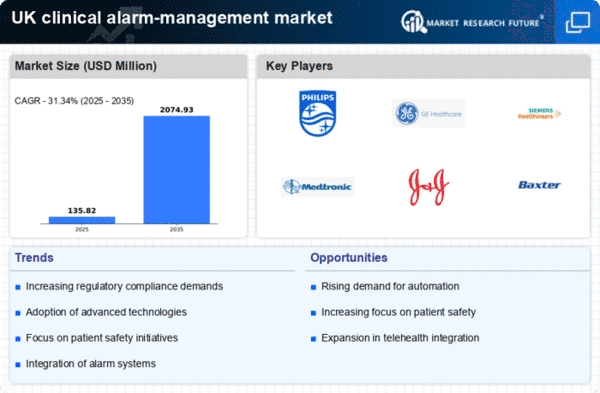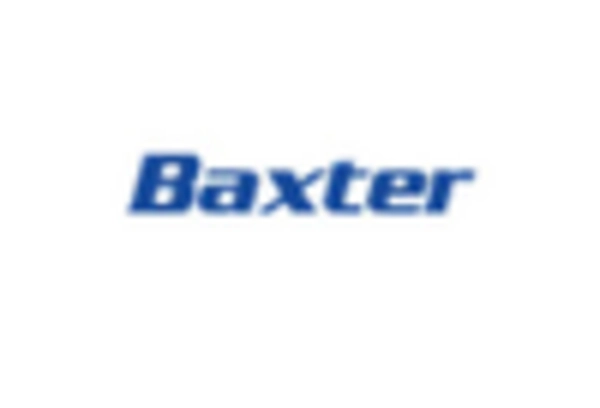Increased Regulatory Scrutiny
The clinical alarm-management market is influenced by the growing regulatory scrutiny surrounding alarm systems in healthcare environments. Regulatory bodies in the UK are emphasizing the need for compliance with safety standards, which has led to a surge in demand for alarm management solutions that meet these requirements. Healthcare providers are increasingly required to demonstrate adherence to best practices in alarm management, which may involve substantial investments in new technologies and training. This regulatory landscape is expected to propel the clinical alarm-management market forward, as institutions seek to align with compliance mandates while enhancing patient safety.
Rising Demand for Patient Safety
The clinical alarm-management market is experiencing a notable increase in demand driven by the heightened focus on patient safety within healthcare settings. As hospitals and clinics strive to reduce adverse events related to alarm fatigue, the need for effective alarm management systems has become paramount. Recent data indicates that alarm-related incidents contribute to a significant number of patient safety issues, prompting healthcare providers to invest in advanced alarm management solutions. The clinical alarm-management market is projected to grow as institutions prioritize the implementation of systems that enhance patient monitoring and reduce alarm overload, thereby improving overall care quality.
Growing Awareness of Alarm Fatigue
The clinical alarm-management market is increasingly shaped by the growing awareness of alarm fatigue among healthcare professionals. Alarm fatigue occurs when clinicians become desensitized to alarms due to their frequency, leading to potential oversights in patient care. This awareness has prompted healthcare institutions to seek comprehensive alarm management strategies that prioritize critical alerts and reduce unnecessary notifications. As a result, the clinical alarm-management market is expected to expand as facilities implement solutions designed to mitigate alarm fatigue, thereby improving clinician engagement and patient outcomes.
Focus on Cost Efficiency in Healthcare
Cost efficiency remains a critical driver in the clinical alarm-management market, as healthcare providers seek to optimize their operations while maintaining high standards of patient care. The implementation of effective alarm management systems can lead to reduced operational costs by minimizing alarm fatigue and improving staff response times. Studies suggest that hospitals that invest in these systems can achieve significant savings, potentially reducing alarm-related incidents by up to 30%. As financial pressures continue to mount in the healthcare sector, the clinical alarm-management market is likely to benefit from this focus on cost-effective solutions that enhance both safety and efficiency.
Technological Advancements in Monitoring Systems
Technological innovations are reshaping the clinical alarm-management market, as new monitoring systems are developed to enhance alarm accuracy and reliability. The integration of artificial intelligence and machine learning into alarm systems allows for more precise detection of patient conditions, reducing false alarms and improving response times. This shift towards smarter technology is expected to drive market growth, with estimates suggesting a potential increase in market value by over 20% in the next five years. As healthcare facilities adopt these advanced systems, the clinical alarm-management market is likely to expand significantly, reflecting the ongoing evolution of patient care technologies.
















